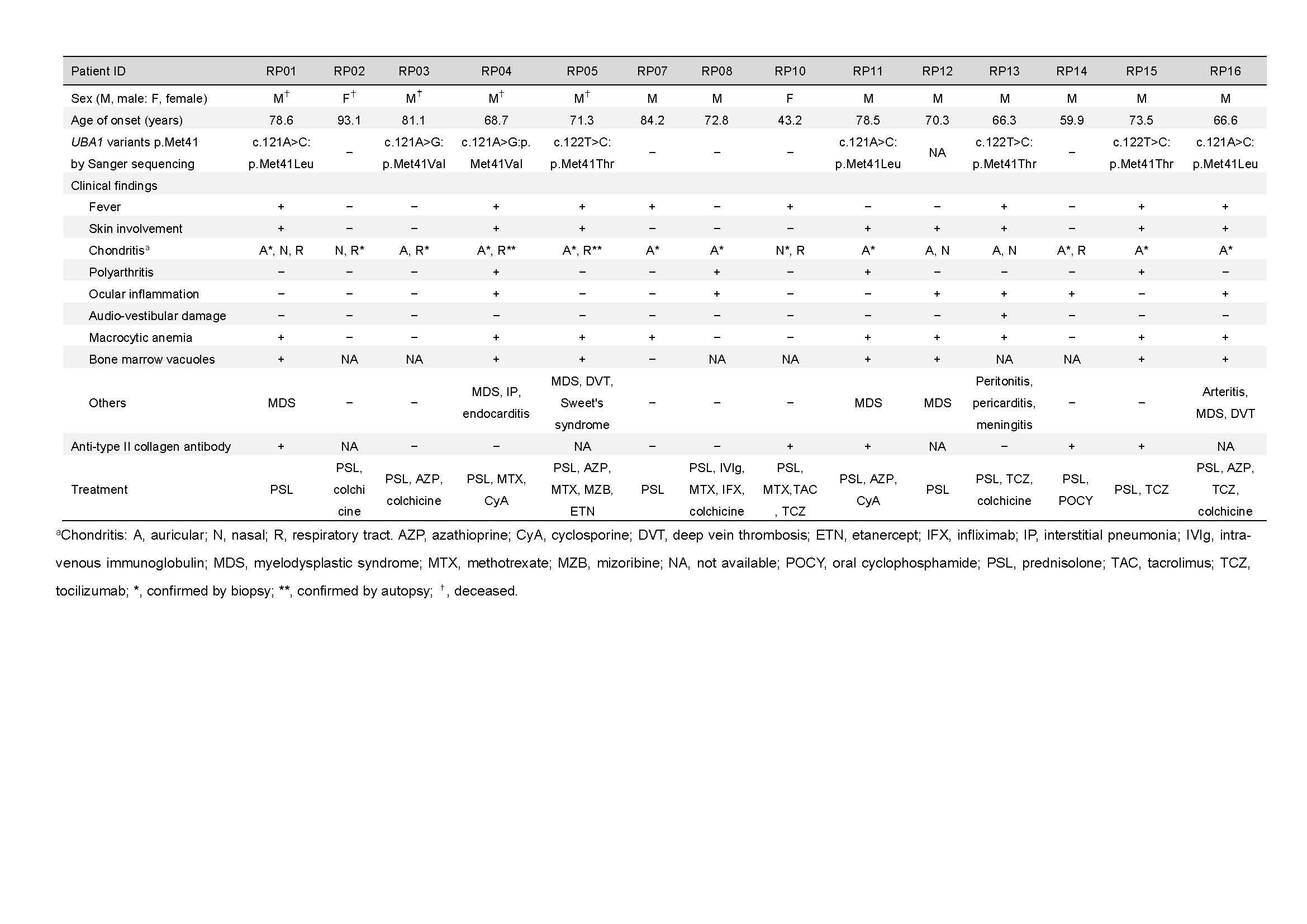Session Information
Date: Monday, November 8, 2021
Session Type: Poster Session C
Session Time: 8:30AM-10:30AM
Background/Purpose: Pathogenic somatic variants in the ubiquitin like modifier activating enzyme 1 gene (UBA1) were discovered in individuals with systemic inflammation of cartilage, skin, and blood vessels accompanied by hematological abnormalities, named VEXAS (vacuoles, E1 enzyme, X-linked, autoinflammatory, somatic) syndrome, affecting only male patients. Some patients with VEXAS were reported to have a relapsing polychondritis (RP) phenotype. To determine clinical and genetic features of individuals with RP likely caused by pathogenic somatic variants in UBA1.
Methods: Fourteen patients with RP who met the Damiani and Levine classification criteria were recruited (12 men, 2 women; median onset age [interquartile range] 72.1 years [67.1–78.0]). Sanger sequencing of UBA1 was performed using genomic DNA from peripheral blood leukocytes or bone marrow tissue. Droplet digital PCR (ddPCR) and peptide nucleic acid (PNA)-clamping PCR were used to detect low-prevalence somatic variants. Clinical features of the patients were investigated retrospectively. Clinical features were compared pathogenic UBA1 variant-positive and negative patients. Categorical variables were analyzed using the chi-square test and exact unconditional z-pooled test. Continuous variables were examined using the Mann–Whitney U test. A p-value < 0.0028 (= 0.05/18) was considered statistically significant using Bonferroni’s corrected p-value for multiple testing (N=18).
Results: UBA1 was examined in 13 of the 14 patients; 73% (8/11) of the male patients had somatic UBA1 variants (c.121A >C, c.121A >G, or c.122T >C resulting in p.Met41Leu, p.Met41Val, or p.Met41Thr, respectively). All the variant-positive patients had systemic symptoms, including a significantly high prevalence of skin lesions. ddPCR detected low-prevalence (0.14%) of somatic variant (c.121A >C) in one female patient, which was subsequently confirmed by PNA-clamping PCR.
Conclusion: Genetic screening for pathogenic UBA1 variants should be considered in patients with RP, especially male patients with skin lesions.
 Table. Clinical features of the 14 patients with relapsing polychondritis and UBA1 variants detected by Sanger sequencing
Table. Clinical features of the 14 patients with relapsing polychondritis and UBA1 variants detected by Sanger sequencing
To cite this abstract in AMA style:
Tsuchida N, Kunishita Y, Uchiyama Y, Kirino Y, Takase-Minegishi K, Yoshimi R, Nakajima H, Matsumoto N. Pathogenic UBA1 Variants in Japanese Patients with Relapsing Polychondritis [abstract]. Arthritis Rheumatol. 2021; 73 (suppl 9). https://acrabstracts.org/abstract/pathogenic-uba1-variants-in-japanese-patients-with-relapsing-polychondritis/. Accessed .« Back to ACR Convergence 2021
ACR Meeting Abstracts - https://acrabstracts.org/abstract/pathogenic-uba1-variants-in-japanese-patients-with-relapsing-polychondritis/
